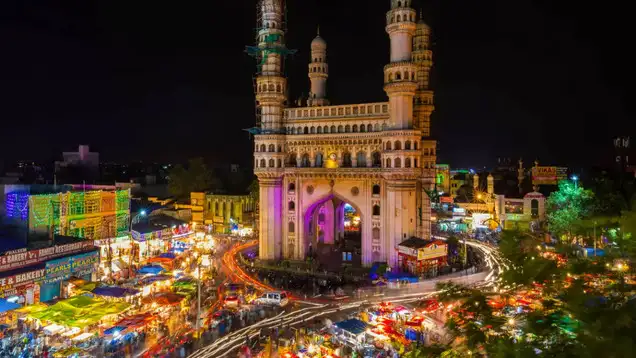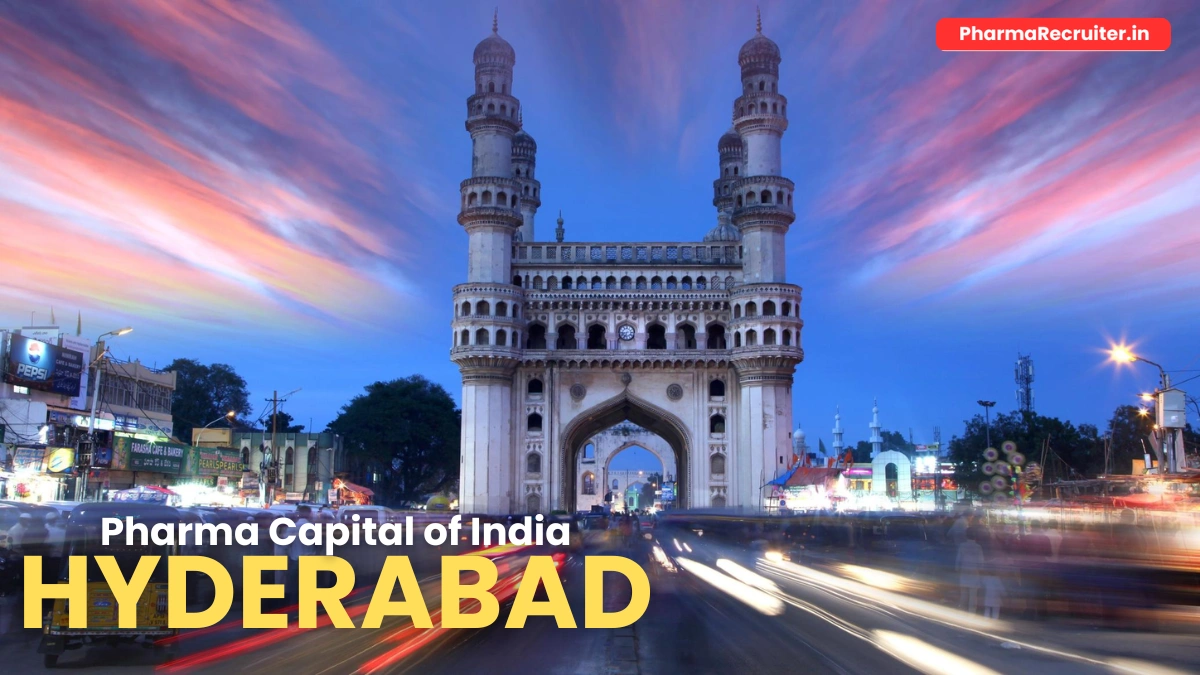India, globally recognized as the “Pharmacy of the World,” supplies 20% of the world’s generic medicines and one-third of its vaccines. Hyderabad, the beating heart of this industry, has earned the title of Pharma Capital of India through its unparalleled contributions to pharmaceutical manufacturing, drug discovery, and global exports.
With a thriving ecosystem of cutting-edge research institutions, a skilled workforce, and strategic government policies, Hyderabad is not only driving India’s pharmaceutical dominance but also positioning itself as the Life Sciences Capital of the World by 2030.
Contents
- 0.1 Introduction: Why Hyderabad is Called the Pharma Capital of India
- 0.2 The History and Growth of Hyderabad’s Pharma Industry
- 0.3 Genome Valley: India’s Largest Biotechnology Cluster
- 0.4 Hyderabad’s Role During the COVID-19 Pandemic
- 0.5 Research, Talent, and Infrastructure Supporting Hyderabad’s Pharma Ecosystem
- 0.6 Economic Impact of the Pharmaceutical Industry in Hyderabad and Telangana
- 1 Economic Impact of Hyderabad’s Pharmaceutical Industry
- 1.1 Contribution to Exports
- 1.2 Employment Generation
- 1.3 Government Support
- 1.4 Future Outlook: Pharma City and Beyond
- 1.5 India’s Pharmaceutical Industry in Context
- 1.6 Key Challenges and Opportunities in Indian Pharma
- 1.7 Conclusion: Hyderabad’s Continuing Leadership in India’s Pharma Sector
- 1.8 FAQs
- 1.8.1 Why is Hyderabad called the Pharma Capital of India?
- 1.8.2 What is Genome Valley, and why is it important?
- 1.8.3 How did Hyderabad contribute to the COVID-19 pandemic response?
- 1.8.4 What is Hyderabad Pharma City, and what is its purpose?
- 1.8.5 What are the key challenges for Hyderabad’s pharmaceutical industry?
- 1.8.6 How does Hyderabad compare to other pharma hubs in India?
Introduction: Why Hyderabad is Called the Pharma Capital of India
India, often hailed as the “Pharmacy of the World,” accounts for nearly 20% of global generic medicine exports and one-third of global vaccine production. At the heart of this pharmaceutical prowess lies Hyderabad, a city that has solidified its status as the epicenter of pharmaceutical innovation, manufacturing, and exports.
Known as the Pharma Capital of India, Hyderabad combines cutting-edge research, world-class infrastructure, and a skilled workforce to drive the nation’s pharmaceutical industry forward. With its strategic policies and robust ecosystem, the city is poised to become the Life Sciences Capital of the World by 2030.
The History and Growth of Hyderabad’s Pharma Industry
The roots of Hyderabad’s pharmaceutical dominance trace back to the 1970s with the establishment of the Indian Drugs and Pharmaceuticals Limited (IDPL), a public-sector undertaking that laid the foundation for the city’s pharma legacy. Over the decades, Hyderabad attracted private and multinational companies, fueled by investor-friendly policies, affordable land, and a rich talent pool.
Companies like Dr. Reddy’s Laboratories, Aurobindo Pharma, and Hetero Labs have transformed Hyderabad into a global hub for pharmaceutical manufacturing and drug discovery. Today, the city contributes nearly one-third of India’s pharmaceutical production and one-fifth of its pharma exports, according to a recent report.
Genome Valley: India’s Largest Biotechnology Cluster
A cornerstone of Hyderabad’s pharma ecosystem is Genome Valley, India’s largest biotechnology cluster, spanning 2,000 acres. This state-of-the-art hub fosters drug discovery, biotech research, and vaccine development, hosting global giants like Novartis, Dr. Reddy’s, and Bharat Biotech.
With over 200 companies and cutting-edge facilities, Genome Valley drives innovation in biotechnology and pharmaceutical R&D. Its role in developing vaccines, such as Bharat Biotech’s Covaxin, has cemented Hyderabad’s reputation as a global leader in life sciences.
Hyderabad’s Role During the COVID-19 Pandemic
Hyderabad emerged as a global lifeline during the COVID-19 pandemic, producing millions of vaccine doses for India and the world. Companies like Bharat Biotech, with its indigenous Covaxin, and Biological E., a key player in vaccine manufacturing, played pivotal roles in the global vaccine supply chain.
Hyderabad’s contribution accounted for one-third of the world’s vaccine output, reinforcing its status as the Vaccine Capital of the World. The city’s robust pharma manufacturing infrastructure and rapid response capabilities were instrumental in addressing global healthcare demands.
Research, Talent, and Infrastructure Supporting Hyderabad’s Pharma Ecosystem
Hyderabad’s pharmaceutical success is underpinned by its world-class research institutions, such as the Centre for Cellular and Molecular Biology (CCMB), Indian Institute of Chemical Technology (IICT), and National Institute of Pharmaceutical Education and Research (NIPER).
These institutions drive innovation in drug development and biotechnology research. The city’s skilled workforce, nurtured by top-tier universities and training programs, ensures a steady pipeline of talent for the industry.
Hyderabad’s logistics infrastructure, including GMR Hyderabad International Airport, facilitates 72% of the city’s high-value pharmaceutical exports to markets like the United States and Europe.
Economic Impact of the Pharmaceutical Industry in Hyderabad and Telangana
Hyderabad’s pharmaceutical industry significantly contributes to India’s economy, accounting for 40% of the country’s bulk drug and formulation exports. The sector has created thousands of jobs, with recent investments of over ₹5,500 crore from 11 pharmaceutical companies expected to generate 9,800 new jobs in the Green Pharma City project.
Telangana’s investor-friendly Life Sciences Policy and initiatives like the Telangana Industrial Health Policy have further boosted the sector’s growth. The state’s vision to become the Life Sciences Capital of the World by 2030 is supported by its thriving ecosystem valued at $80 billion.
Economic Impact of Hyderabad’s Pharmaceutical Industry

Contribution to Exports
- Accounts for 40% of India’s bulk drug and formulation exports
- One-fifth of India’s total pharmaceutical exports originate from Hyderabad
- 72% of Hyderabad’s exports are high-value pharmaceutical shipments to the US and Europe
Employment Generation
- Recent MoUs with 11 pharma companies to create 9,800 jobs
- Investments of ₹5,500 crore in Green Pharma City to boost employment
- Over 1,000 life sciences companies employ thousands in Telangana
Government Support
- Telangana’s Life Sciences Policy offers subsidies and fast-track approvals
- Hyderabad Pharma City project to attract $8.4 billion in investments
- Vision to position Hyderabad as the Life Sciences Capital of the World by 2030
Future Outlook: Pharma City and Beyond
The proposed Green Pharma City, a 19,000-acre integrated industrial park, is set to redefine Hyderabad’s pharmaceutical landscape. Designed to house eco-friendly pharma manufacturing units, the project has attracted investments from major players like Dr. Reddy’s Laboratories, Aurobindo Pharma, and Laurus Labs.
Expected to create 5.6 lakh jobs and attract $8.4 billion in investments, Green Pharma City will enhance Hyderabad’s capacity for pharmaceutical innovation and global exports. The project aligns with Telangana’s vision to build a sustainable, world-class pharma ecosystem.
India’s Pharmaceutical Industry in Context
India is the world’s largest supplier of generic medicines, with a market size projected to reach $130 billion by 2030. The country accounts for 20% of global generic drug exports and one-third of vaccine production.
Hyderabad leads among India’s pharma hubs, outpacing cities like Mumbai, Bengaluru, Pune, and Gujarat. While Mumbai excels in corporate headquarters and Bengaluru in biotech innovation, Hyderabad’s strength lies in its integrated ecosystem of manufacturing, R&D, and exports.
Key Challenges and Opportunities in Indian Pharma
The Indian pharmaceutical industry faces challenges like increasing R&D costs and regulatory compliance but is poised for growth through opportunities such as:
- R&D Investments: Companies like Sai Life Sciences are expanding R&D capabilities in Hyderabad to drive innovation.
- E-Pharmacy Growth: The rise of e-pharmacy platforms is transforming healthcare delivery, with Hyderabad at the forefront.
- Patent Expiries: Opportunities for generic drugs as blockbuster drugs lose patent protection.
- Government Support: Incentives like the Production Linked Incentive (PLI) Scheme bolster pharma manufacturing and exports.
Conclusion: Hyderabad’s Continuing Leadership in India’s Pharma Sector
Hyderabad’s rise as the Pharma Capital of India is driven by its robust ecosystem, strategic investments, and global partnerships. With Genome Valley, world-class research institutions, and the upcoming Green Pharma City, the city is well-positioned to lead India’s vision of becoming a global pharmaceutical powerhouse.
As Hyderabad continues to innovate and expand, it will play a pivotal role in shaping the future of healthcare worldwide.
For more insights on Hyderabad’s pharma industry, visit BioAsia and PharmaTech Summit.
FAQs
Why is Hyderabad called the Pharma Capital of India?
Hyderabad is known as the Pharma Capital of India due to its significant contributions to pharmaceutical manufacturing, drug discovery, and global exports. The city hosts major companies like Dr. Reddy’s Laboratories and Bharat Biotech, alongside Genome Valley, India’s largest biotechnology cluster, driving innovation and producing 40% of India’s bulk drug and formulation exports.
What is Genome Valley, and why is it important?
Genome Valley is a 2,000-acre biotechnology cluster in Hyderabad, hosting over 200 companies, including Novartis and Aurobindo Pharma. It is a hub for drug discovery, biotech research, and vaccine development, playing a key role in innovations like Bharat Biotech’s Covaxin.
How did Hyderabad contribute to the COVID-19 pandemic response?
During the COVID-19 pandemic, Hyderabad emerged as the Vaccine Capital of the World, producing one-third of global vaccine doses. Companies like Bharat Biotech (Covaxin) and Biological E. supplied millions of doses worldwide, leveraging the city’s robust pharma manufacturing infrastructure.
What is Hyderabad Pharma City, and what is its purpose?
Green Pharma City is a proposed 19,000-acre eco-friendly industrial park in Hyderabad aimed at boosting pharmaceutical manufacturing and innovation. It is expected to attract $8.4 billion in investments and create 5.6 lakh jobs, strengthening Hyderabad’s position as a global pharma hub.
What are the key challenges for Hyderabad’s pharmaceutical industry?
The industry faces challenges like rising R&D costs and stringent regulatory compliance. However, opportunities such as generic drug production due to patent expiries, growth in e-pharmacy platforms, and government incentives like the Production Linked Incentive (PLI) Scheme are driving growth.
How does Hyderabad compare to other pharma hubs in India?
While Mumbai excels in corporate headquarters and Bengaluru in biotech innovation, Hyderabad leads with its integrated ecosystem of pharmaceutical manufacturing, R&D, and exports. It outpaces other hubs like Pune and Gujarat, contributing significantly to India’s $130 billion pharma market projected for 2030.


